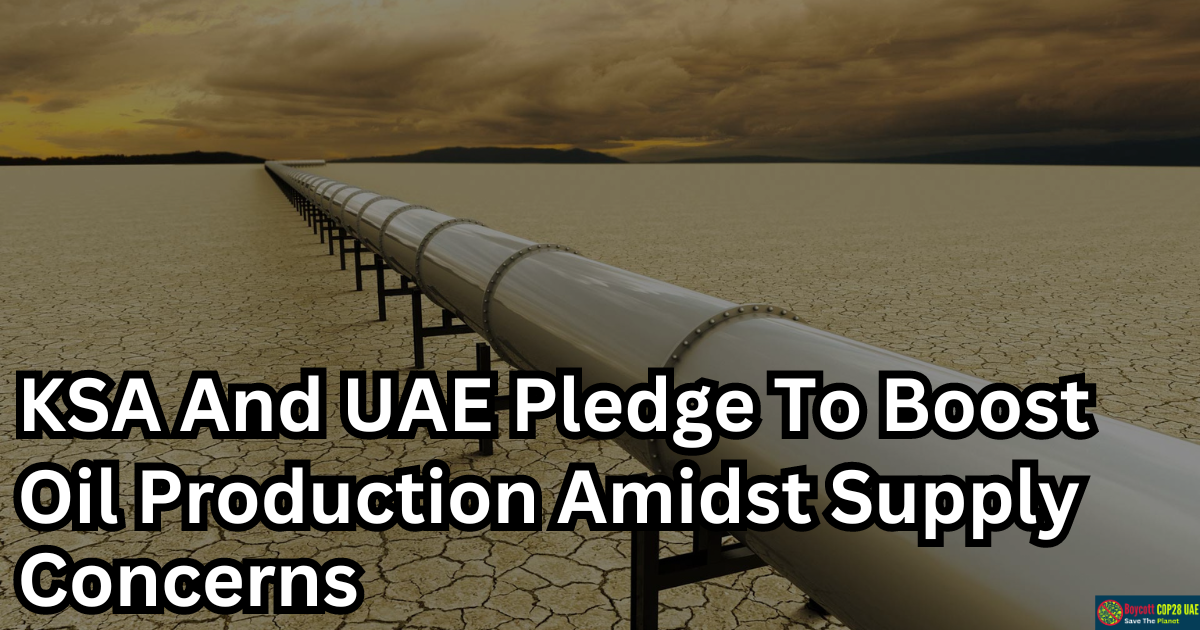In a significant move that could have far-reaching implications for global energy markets, Saudi Arabia and the UAE have vowed to ramp up their oil production in response to concerns about a potential winter supply crunch. This commitment comes at a time when the UAE is gearing up to host COP28, the 28th Conference of the Parties to the United Nations Framework Convention on Climate Change. While both nations are positioning themselves to benefit from this strategic move, it has not been without controversy, as activists voice their objections and concerns regarding the environmental impact.
The decision to increase oil production is seen as a proactive response to the looming uncertainty surrounding energy supplies, particularly as winter approaches. Recent reports of dwindling reserves and geopolitical tensions have raised concerns about the stability of global energy markets. In this context, Saudi Arabia and the UAE aim to safeguard their interests by bolstering their oil output ensuring a steady flow of oil to meet domestic and international demand.
The UAE’s upcoming hosting of COP28 adds an intriguing dimension to this development. While the nation prepares to play a pivotal role in discussions on climate change and sustainable practices, its decision to boost oil production seems paradoxical. Critics argue that this move contradicts the UAE’s commitment to decreasing carbon emissions and transitioning towards renewable energy sources, as outlined in their ambitious “Energy Strategy 2050.”
However, the UAE’s government defends its stance by emphasizing the need for a balanced approach. Officials argue that increasing oil production is a pragmatic response to the prevailing energy situation, allowing the nation to cater to its growing energy demands while simultaneously advancing its green energy agenda. They claim that the additional revenue generated from increased oil exports will be invested in renewable energy projects, fostering a sustainable transition over time.
Saudi Arabia, the world’s largest oil exporter, joins the UAE in this pledge to boost production. The two Gulf nations are keenly aware of the potential economic benefits that come with higher oil prices and increased production. With both countries heavily reliant on oil revenue to support their economies, a boost in production could provide a much-needed fiscal boost, especially in the wake of the COVID-19 pandemic’s economic impact.
Nonetheless, this decision has sparked a wave of protests and activism, particularly from environmental groups and climate change advocates. Many activists view the increased oil production as a direct contradiction to the goals of COP28 and an impediment to global efforts to combat climate change. They argue that hosting a climate conference while simultaneously increasing fossil fuel production sends a mixed message and undermines the credibility of the UAE’s commitment to sustainability.
As the controversy surrounding this issue continues to mount, some activists are even calling for a boycott of COP28. A coalition of environmental organizations, including Greenpeace and Extinction Rebellion, has issued a joint statement condemning Saudi Arabia’s and the UAE’s actions. They have called for a boycott of the conference, urging participating nations and delegates to take a stand against the paradoxical approach adopted by the host nation.
Final Words
The situation remains fluid, with activists, experts, and policymakers closely monitoring developments in the lead-up to COP28. The actions of Saudi Arabia and the UAE have added a layer of complexity to the global climate debate, highlighting the challenges of reconciling short-term economic interests with long-term environmental sustainability. As the conference draws nearer, all eyes will be on the UAE and its role in shaping the global response to climate change while managing its oil production for its benefit.






